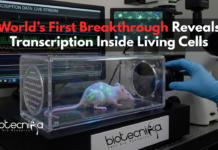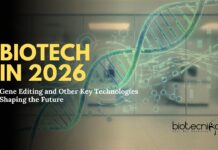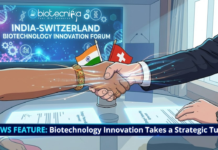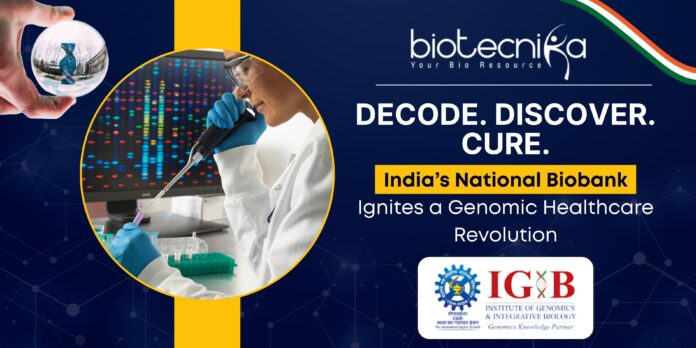Decode. Discover. Cure. India’s National Biobank Ignites a Genomic Healthcare Revolution!
In a significant step set to reshape India’s healthcare future, the Government of India has taken a significant leap towards population-specific treatments and Precision Medicine. Dr. Jitendra Singh, Union Minister of State (Science & Technology) and CSIR’s Vice President, inaugurated the “Phenome India National Biobank” and unveiled India’s first longitudinal population Health study at the prestigious CSIR-IGIB (Council of Scientific & Industrial Research – Institute of Genomics and Integrative Biology) in New Delhi. This initiative marks the beginning of a new era where your environment, DNA, and lifestyle can impact your personalized treatment plans, and this step is more than just a scientific milestone in itself. This signals India’s growing and evolving leadership in Personalised Medicine and Genomics.
From developing indigenous CRISPR (Clustered regularly interspaced short palindromic repeats) therapies to fighting diseases and decoding rare Genetic Disorders, this National Biobank is ready to become the Next-generation Medical Research’s backbone. Wondering how this will change the way we fight Diabetes, Drug resistance, or Cancer?
Then, read on to discover how India is transforming diversity into discovery, vision into a vibrant reality, and datasets into Diagnoses for the Healthcare industry.
Biobank for a Better and Healthier India
This newly launched “India’s National Biobank” is a futuristic, sophisticated, and advanced facility that is especially designed for collecting, storing, as well as analyzing lifestyle, Clinical, and Genetic Data from over 10,000 people in the country. It is modeled on global initiatives such as the United Kingdom Biobank. This Indian Biobank emphasizes India’s unique Socio-cultural and Genetic diversity. This represents an infrastructure for long-term Research on Gene-Environment interactions, Personalized Therapeutics, and Disease mechanisms.
During the inauguration, Dr. Jitendra Singh stated, “This transition to Personalised Healthcare is no longer theoretical – it is becoming reality, driven by indigenous innovations.” He highlighted the importance of customizing Health interventions to Indian personalized needs. He further added “Today, we hold the promise of a future where every Indian may receive individualized treatment tailored to their Genetic makeup, lifestyle, and Environment.”
Enabling Precision Medicine through Longitudinal Data
The Project “Phenome India,” under which India’s National Biobank is developed, is set to track individual Health trajectories over the years. Researchers and Scientists’ goal is to unveil patterns related to non-communicable Diseases such as Cardiovascular Disorders, Diabetes, Rare Genetic conditions, and Cancer.
Dr. Singh highlighted the need for population-specific research by showcasing the unique health risks faced by Indians. He stated, “Our conditions are complex and deeply heterogeneous,” noting how Indians, despite having a lean body structure, could suffer from central obesity (a health condition related to increased cardiovascular disease risk). He further explained, “This is where the Biobank becomes vital—it allows us to decode that complexity.”
Driving Innovations
India’s scientific community is rapidly advancing in frontier technologies such as CRISPR Gene Editing, Quantum Technology, and Artificial Intelligence. Dr. Singh emphasized that the India’s National Biobank would act as a foundation for these technologies by providing high-resolution datasets required to train AI models and develop Gene-guided therapies.
He also spotlighted the CSIR-IGIB’s ongoing work in cutting-edge biomedical research:
“CSIR-IGIB Advances Indigenous CRISPR Trials on Sickle Cell Anaemia, Anti-Microbial Resistance, Liver Fibrosis and Rare Disorders,” Dr. Singh highlighted, praising the institute for translating cutting-edge Science into real-world applications that benefit Indian populations, including tribal communities.
By providing high-resolution, population-specific data, the Biobank will enable the development of more robust AI models and support the advancement of gene-guided treatments. These tools, when grounded in indigenous data, promise to improve diagnosis accuracy as well as drug efficacy.
Bridging Research, Industry, and Public Health
Dr. Singh emphasized that innovation should not remain confined to laboratories. He called for deeper partnerships between Government Agencies, Scientific Institutions, and Private Industry, especially in critical areas such as Antimicrobial Resistance (AMR) and affordable Diagnostics.
He stated, “Research must extend beyond the lab—it must find takers in the market and beneficiaries in society,” underlining the importance of translating research into accessible healthcare solutions.
This bold step aligns with the CSIR’s broader vision of Research for Societal Impact through inclusive initiatives that target tribal and rural health challenges.
CSIR’s Vision
Director General of CSIR and Secretary of DSIR, Dr. N. Kalaiselvi, appreciated the Biobank as a “visionary and bold” step in India’s journey toward healthcare self-reliance.
She further stated, “The depth and diversity of India’s cohort data could one day rival or even surpass international counterparts like the UK Biobank.”
Dr. Kalaiselvi also highlighted CSIR’s contributions to developing Indigenous CRISPR-based therapies, community-linked interventions for disorders such as Sickle Cell Anemia, and affordable diagnostics, reinforcing the organization’s commitment to bridging innovation and inclusion.
IGIB: Two Decades of Genomic Leadership
Dr. Souvik Maiti, Director of CSIR-IGIB, shared that the institute was among the first in India to initiate Human Genome Sequencing, stating, “at a time when sequencing tools were practically non-existent.”
Over the last few decades, CSIR-IGIB has led significant Research in areas such as COVID-19 Genome Sequencing, rare genetic disorder diagnostics, as well as the launch of India’s first Drug-Genome Mapping Project. Today, its portfolio extends into women-centric Space Biology, Genomics, as well as AI-enabled pilot fitness evaluations in collaboration with the Indian Air Force.
Dr. Maiti further affirmed, “Our mission has always been to solve local health challenges using global technologies.”
Shaping the Future of Healthcare
The launch of the “Phenome India Biobank” is the beginning of a new Healthcare horizon in India. By anchoring its Healthcare strategy in Data, Science, and diversity, the country is preparing to tackle 21st-century Health challenges with unprecedented precision.
The initiative empowers researchers to ask fundamental questions:
- How do Environment and Genetics intertwine to influence Health?
- Why do identical therapeutics work differently in two patients?
- Why do some Indians develop Diseases such as Diabetes early?
In seeking these answers, India is not only participating in the global health revolution; it is also helping to lead it.
With political will, Scientific foresight, and Institutional strength aligning at a Historic juncture, India’s launch of the “Phenome India Biobank” stands as a ray of light for the country’s Scientific ambitions. India’s National Biobank more importantly, it offers a promise to build a Healthcare system where no Indian is left behind, and every treatment is as unique as the individual who receives it.























